#because it EXISTS but because a lot of people use their religion as a pointed barb to discriminate against huge swaths of people
Text
Hey, hear this!
I'm not black and don't know that much about voodou. There are lots of people ready to talk and explain their concerns about their representation in HH. Please hear them! (the amount of disrespect done by a bunch of non-black people upon the topic is disgusting!)
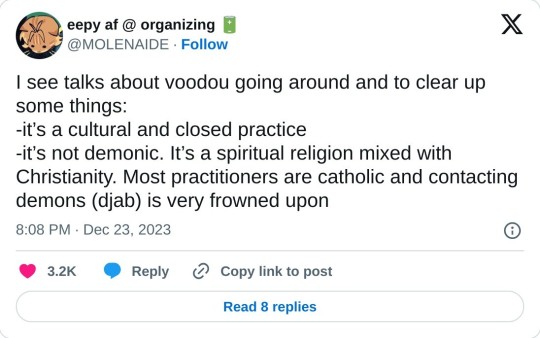
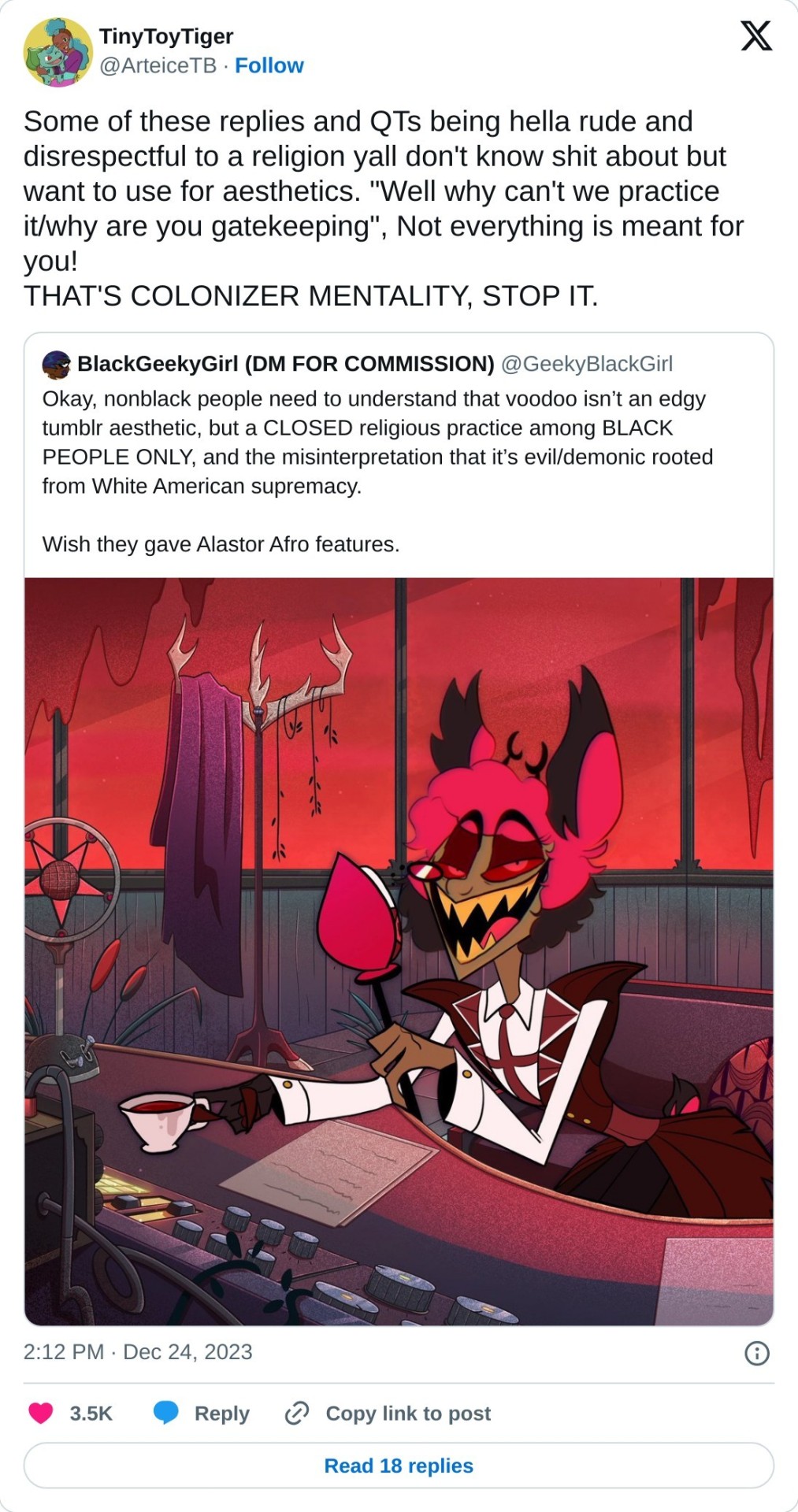
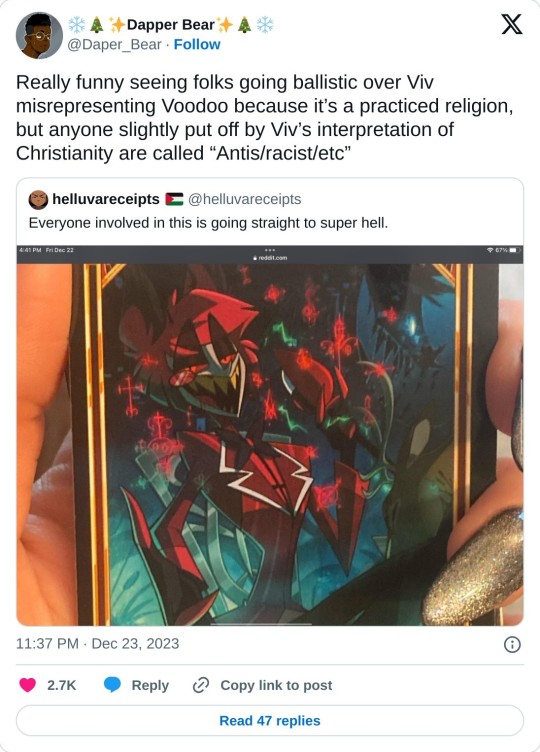
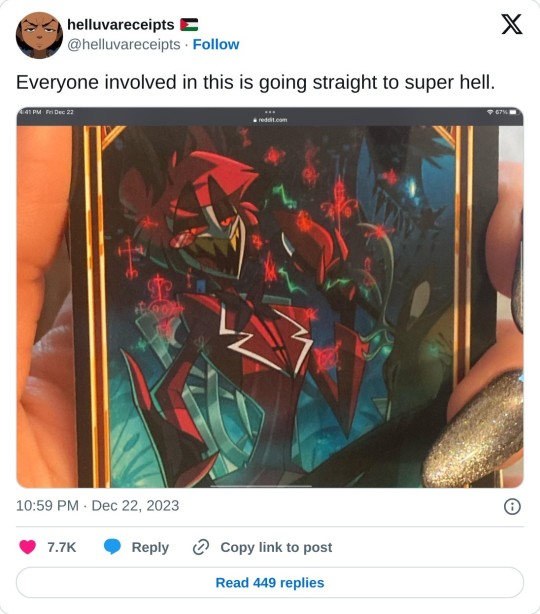
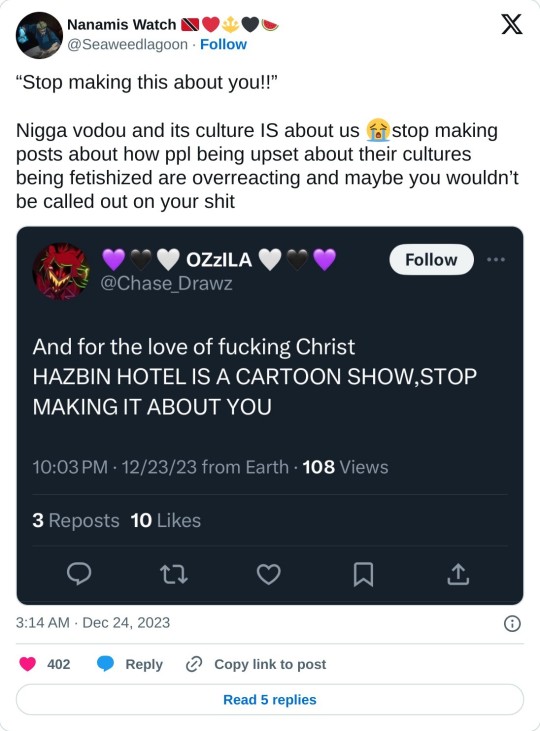
The demonizing and villainizing of this religion has existed since the time of slavery. Using this symbols and closed religion to make a character more "edgy demon evil" is awful. This was Viv doing exactly. I do not believe Al was even supposed to be black/mixed until Viv got told about the use of the religion she was using. All of her main black characters have 0 features. They are just black to profit of "diversity" while she makes no effort to show it or be respectful.
To the people being like, "Aren't you also mad about her representing Christianity wrong???" Based on the fact of how she has talked about Christian people before... YES (I have a whole post about worrying it). But the point brought up is about a religion that's under discrimination based on racism and colonizer mindsets. About a problem that existed when slavery started. Viv is not making a critique or tribute of Voodou she is just using it to make Alastor seem "COOL AND EDGY".
I also do worry of the point she is trying to make about Christianity and believing in it. Specially cause that means her story about heaven and hell could be the blandest immature criticism someone could make. -and sell more people into the idea of "all believers of Christianity are bad people". Which I still hope, it doesn't happen directly in the show. Btw, I'm not Christian! I'm queer and have faced a lot of discrimination that a lot of people justified in their Christianism, I know the level of frustration people feel relating to that. But I have grown to realize, not every person that believes in God and Christ is a bad person. And that I don't get to throw all of those people under the umbrella of "bad" because of how I have been treated.
BTW, this person got blocked by Viv:
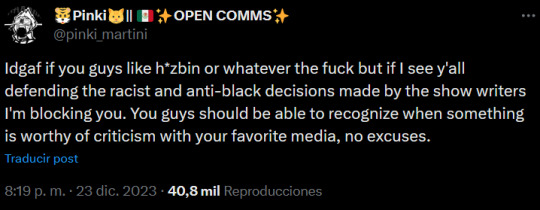
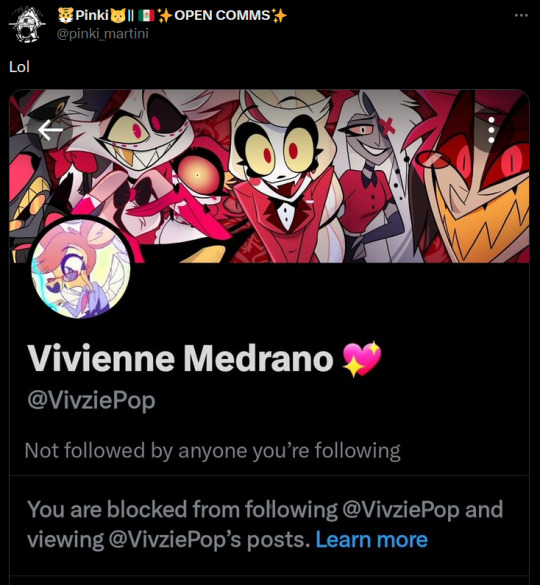
ALSO, THIS IS STUPID!
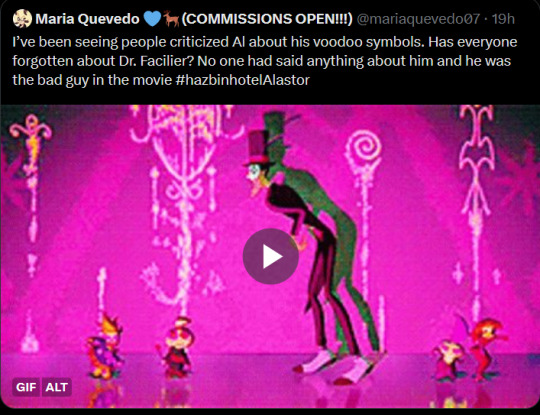
You are crazy to say this. They are many criticisms of Disney, specially this movie. You just didn't see it and decided to tweet this without even thinking of searching for this? Like, have you never heard of people complaining about how Tiana as the first black princess becoming a fucking frog for most of the movie.
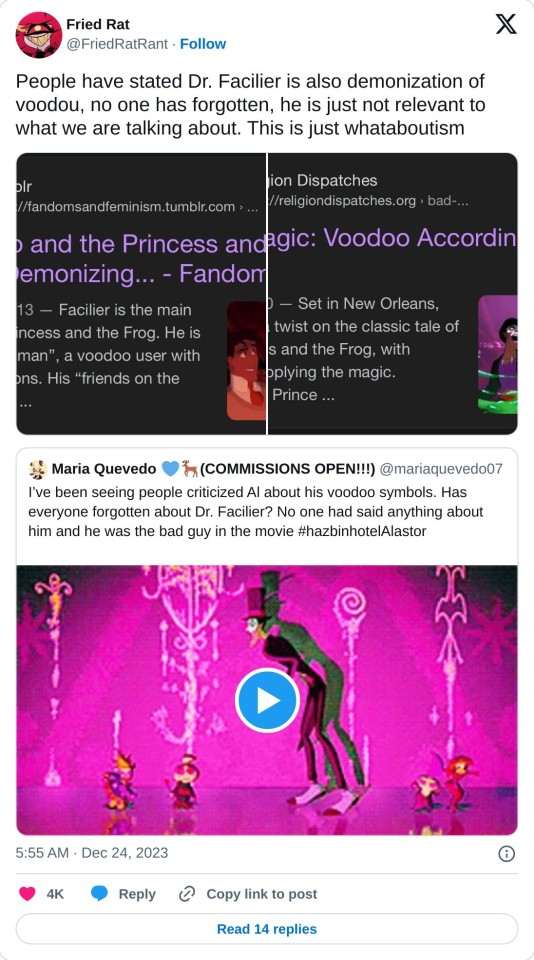
Dr. Facilier is a demonization of voodou! Also, Mama Odie is the "Good magic" but realize how she doesn't use the symbols or African masks. But only the bad magic, has it? Most of the representation of the religion is Facilier too, and it's wrongly represented.
youtube
EDIT:
NAHHHH. GIRL
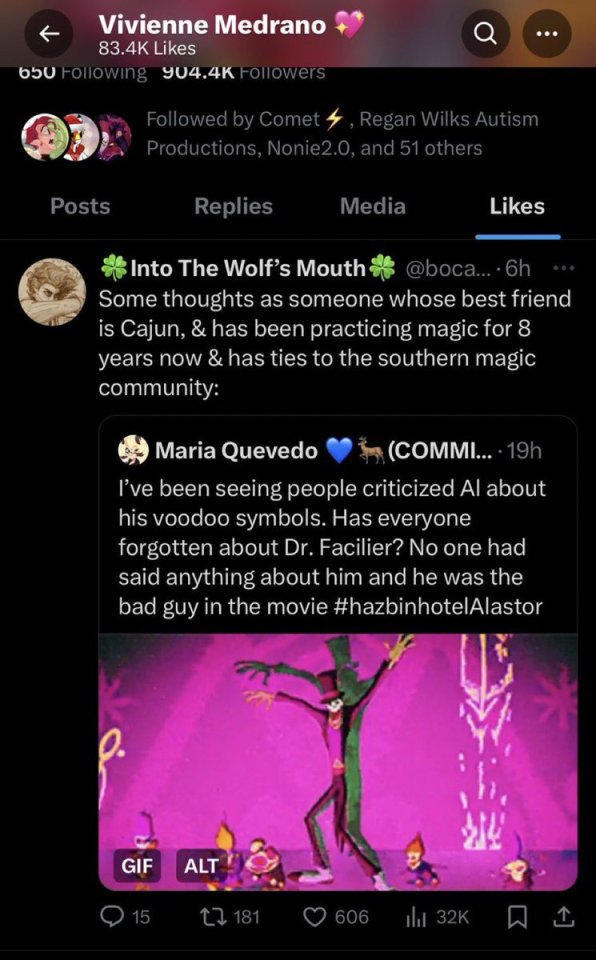

#vivziepop critique#vivziepop critical#helluva boss critique#helluva boss criticism#helluva boss critical#hazbin hotel critical#hazbin hotel criticism#hazbin hotel critique#discrimination#antiblackness#disney criticism#disney critical#anti vivziepop#Youtube
1K notes
·
View notes
Text
And just to follow up on that previous reblog without derailing it: a lot of the really weird relationships and discourse that exist out there in the neo-pagan, Satanist, and atheist communities are in fact echoes of the weird relationship that Xtianity has with Judaism.
Xtianity has a weird, tumultuous relationship with Judaism because they must simultaneously validate the Tanakh and the Jews who created it or else their own religion is devoid of context and built on a house of cards. But! If they validate Judaism, then they have to grapple with the fact that the Jews did not accept their interpretation of the Tanakh, that we still, against all odds, exist, and that because we still exist, we are still around to point out the ways in which the New Testament does not fit with the Tanakh and that the Tanakh does not inherently or naturally point to Jesus. And that's to say nothing of the bloody history of Xtianity towards Judaism. Our continued existence is a sore point and a weakness in the Xtian narrative that has been a constant source of irritation, frustration, and violence since the dawn of Xtianity. And, at the same time, there is a certain fascination with Judaism related to things that have been appropriated by Xtians or understood as particularly useful in spreading supercessionist ideas. So what you wind up with is a toxic mix of antisemitism and philosemitism (effectively fetishization and orientalism) that drives too many Xtians to "love" us by attacking our beliefs and way of life, and stealing whatever they think will be most helpful in their mission (especially as it pertains to Jews) in order to try and convert us.**
Many people who have also been hurt from inside of Xtianity or by the broader Xtian culture they live in seek to deconstruct those ideas by creating an inverse of Xtianity in one way or another. Those who turn to Satanism typically do this by worshipping the opposite force of the Xtian god. Those who turn to neo-paganism typically do this by embracing an unambiguously polytheistic religion and/or by turning to the cultural historical enemies of Xtianity. Those who turn to atheism typically do this by rejecting "God," "faith," and "organized religion" (as these concepts are understood by Xtian norms.)
And honestly? That's fine. If it helps, if it brings you meaning and joy, knock yourselves out. I have no problem with people turning to these beliefs for reasons of healing as well as simply being drawn to it. And for what it's worth, I did a similar thing by turning to Judaism. Obviously I had many other reasons for becoming a Jew as well, and I assume that's true for the aforementioned folks, too. Judaism healed a lot of Xtianity-shaped wounds for me, and if your paganism, Satanism, and/or atheism helps you in the same way as well as bringing you meaning, I sincerely wish you the best.
However, the problem is that many times, unless you turn to Judaism and learn our side of the story, it's very difficult to deconstruct the antisemitism of your past entanglement with Xtianity. Xtian antisemitism has permeated western society so thoroughly for so long that it is real *work* to identify and unlearn it. Those converting to Judaism have the benefit of the Jewish community and extensive educational resources to help. Other folks do not.
Here's the problem: if you simply invert Xtian ideas, you are still treating Xtianity as the baseline reality from which your other assumptions and beliefs flow. If you just choose the opposite at every chance, you divorce yourself from Xtianity, but not its prejudices.
Now you might fairly ask, "hey Avital, if we are making the opposite choice at every turn, wouldn't that invert the antisemitism to being at least neutral if not positive towards Judaism?" And that would be perfectly logical! But unfortunately deeply and (for us) dangerously incorrect.
The reason is because (1) antisemitism has never been rational but reactionary instead, (2) philosemitism is also bad, and (3) it is structured in a way that it's pretty much always "heads I win, tails you lose." Have you ever noticed that according to antisemites, Jews are both ultra-white and also dirty foreign middle eastern invaders? That we are supposedly very powerful and run the world, but are also weak and degenerate? That both the Right and the Left have extensive antisemitism problems? Etc.? There's a reason - it's because antisemitism is designed to other us no matter what. So oftentimes I see folks inverting Xtian philosemitism to being "those awful fundamentalist Old Testamenters" or inverting Xtian antisemitism to valorizing Judaism, but only to the extent that they can meme-ify our religion down to fighting God and/or being un-pious godless liberals.
But like other groups, we are a diverse and complicated group with a very long history and a lot of trauma to boot.
If you're trying to unpack your Xtian conditioning, please also unpack your antisemitism and philosemitism. If not for our sake and for it being the right thing to do, at least do it for yourselves, because unless you deconstruct that as well, you will still be operating within a really ugly aspect of a Xtian mindset.
(**Please note that this isn't literally all Xtians everywhere, but it is a lot of Xtians in most places and throughout most of history. There are absolutely Xtians who are good allies to Jews, but they are much smaller in number and are swimming upstream in their relationship to both Jews and Xtianity.)
2K notes
·
View notes
Text
my wife brought up a brilliant point this morning: a huge problem with the way we view psychology (a problem which is frequently exploited + used to justify a lot of just. shitty work) is that it lives in a no-man's land between "social sciences" + "natural sciences" in the collective imagination.
consider: one of the first works which spurned my interest in psychiatric abolition was durkheim's work on suicide. as a sociologist ("social scientist"), he uses pretty rigorous quantitative methods to show that suicide is much less correlated with levels of depression than it is with cultural factors (like religion, country of origin, marriage rates). however, people do not respond to the medicalization of suicide by saying "well, durkheim proved that suicide isn't a mental illness symptom, so this is unscientific"- this is obviously a drastic oversimplification of his work + it's commonly understood that sociology does not "prove" immutable social truths.
similarly, i would not comment on a study which identifies changes in t-cells over time among hiv+ patients by arguing that it didn't deeply explore the social environments or past traumas they had experienced, (even though those could have an impact on t-cell count), because i understand that is not the purpose of the research + ultimately they had to choose to control for these factors without centering them in order to obtain important medical information. "this information is meaningless because it doesn't include each patient's trauma history" would be an absurd critique.
among the general population + many self-assured researchers, psychology gets both the privilege of being a "social science" (so we can't expect it to be TOO exact; it's complicated; it's not really saying that's ALWAYS true; if it proves inaccurate that's because culture/social factors must have muddied it up; we can't really expect PROOF for most of it) as well as a "natural science" (you can't question its basic presumptions or you're a science denier; the dsm describes real things which existed even before it was written; it obviously is rooted in biology even if we haven't discovered how yet; reducing its measures to quantitative evaluation is fine + unproblematic).
my point here isn't to argue that psychology is a "social" or "natural" science, but rather that we need to rethink what work those categories actually do + whether the distinction between them is as strict or meaningful as we believe it to be. our strict dichotomies between "objectively proven truths" + "social observations which are ultimately just informed opinions" are exposed when we look at a field which seems to be uncomfortably situated within both. what kind of work might become possible if we abandoned this dichotomy, rather than bickering over whose work belongs in which club?
#tagging this b4 i start: prayers for me that this can be concise cuz i have a bunch of dead french guys to read for class#psych abolition#ok it wasnt too bad
302 notes
·
View notes
Text
A Palestinian man is asked in an interview by a white woman if he condemns Hamas while his people are being slaughtered in the open, and HE is the one condemned when he yells that it's injustice to insulate that his people deserve to be murdered, because "Hamas chose this."
A black woman is attacked first in a fight and SHE is the bad guy when she strikes back, she is the one whose face is plastered all over social media to be condemned and shamed for "aggression."
Two sisters are appropriately reacting to their oppressors by ripping off posters promoting their propaganda, and THEY are shamed and attacked for their lack of politeness when their people are being killed for existing.
An American democrat watches her colleagues cheer on genocide and ethical cleansing, the murder of children and the rape of women and the slaughter of families, and SHE is the one censored for speaking out in defense of them, despite her grief of losing family members.
Zionists are not condemned for enjoying the thought of children being killed, for calling Palestinians "animals" or saying Gaza should be "turned into a parking lot", Israeli doctors can get away with demanding that Palestinians, HUMAN BEINGS, should be murdered, that their only remaining hospital should be crushed.
They are not condemned for saying they wanted nuclear weapons unleashed on Gaza, they are not condemned for the imprisonment and torture of children, for desecrating dead Palestinians' corpses and mauling their bodies, for mocking Muslim Palestinians by rubbing their bullets against pig's skin before shooting them, for bombing Palestinian churches, for bombing universities, for shutting electricity from Gaza, cutting Palestinians from food and water, not letting them access to aid, for bombing CANCER hospitals and CHILDRENS HOSPITALS, for turning the sky of Gaza RED from explosions, for killing enough students that the entire school year was canceled, for annihilating families, for attacking Jewish people in Jerusalem, for cutting dead fetuses off dead mothers, for STEALING THEIR SKIN AND ORGANS and using them for their benefit, for forcing CHILDREN to hold a press conference to say that hey, they want to live.
Insinuating that this is about religion is the basis of Zionism. 60 members of Hamas were killed, and 10,500 civilians killed, 4000 of which are children. Over 800 bloodlines erased. Israel says they aim for "damage, not accuracy." Implying this is about Hamas is lies.
When white people in power tell you from their air-conditioned studios this is Israel defending itself, refuse to let Palestinian journalists explain things happening from their point of view, watch those journalists lose their entire families for speaking about what's happening to them, demonize Arabs who rage about injustice, ask Palestinians grieving if they condemn Hamas, know this is propaganda.
You shouldn't need them to tell you they're parroting lies to you. Their lies kill people. Their lies destroy people. Their apologies are insincere and their "sympathy" is limited only to those who look like them. It is unjust. It is cruel.
If I was were to narrate to you every atrocity Israel commited that I am aware of, I would never stop typing.
#and no matter how much people will yell about this#zionists will only listen to other zionists#no matter how brilliant and educated a non-white person#can be#their opinions and thoughts are disregarded#cnn only aired an interview from a nurse working at the Indonesian hospital in gaza because she was white#no matter how many people yell for the world to free Palestinians#how many humans with heart and grace do so#the congress and biden are the ones with power.#listen to people and be patient#we should not quiet down once a ceasefire is called.#we should keep yelling until every man and woman and child and tree and house in Palestine is free#until the birds chirp again without being shot down.#palestine#free palestine
357 notes
·
View notes
Text
There's a specific concept from Good Omens that I really like (amongst many others), that I was chuffed to also find in a Sandman and a Discworld story!
I love that in Good Omens (both book and TV), Heaven and Hell are presented as mostly redundant and ineffectual when it comes to human morality - and that Hell in particular find some of the things humans do to be pretty shocking, and/or instructive.
Opportunities for humour aside, this idea flies in the face of the common belief that the world's worst ills are the result of outside forces influencing people to do evil (ie the devil. Or ... lizard people etc? I digress). And it's unlike other stories out there that are like, "World War II was actually caused by xyz characters!" or similar. Good Omens doesn't rewrite history like that, or let us - humanity - off the hook when it comes to the big stuff, when it could so easily have done so in a universe where Heaven and Hell are literally real.
The story, of course, also credits human cleverness to humans, and celebrates the things we should be proud of, like art, music, delicious food, craftmanship, invention, etc. And it credits humans for having a propensity for compassion and goodness.
"[Crowley] did his best to make their short lives miserable, because that was his job, but nothing he could think up was half as bad as the stuff they thought up themselves. […] And just when you'd think they were more malignant than ever Hell could be, they could occasionally show more grace than Heaven ever dreamed of. Often the same individual was involved."
I love this concept because I see it as an uncoupling of religion and morality. They can both exist together, but the former isn't necessary for the latter. (This isn't the only possible interpretation; the more literal reading might be more about free will, but this is where I extrapolated it to).
From Sandman: Season of Mists Episode 2 (plot context stripped out to avoid spoilers, but skip ahead to black text if you want absolutely nothing spoiled if you want to read it).
Lucifer: "And the mortals! I ask you - why? […] Why do they blame me for all their little failings? They use my name as if I spend my entire day sitting on their shoulders, forcing them to commit acts they would otherwise find repulsive. 'The devil made me do it.' I have never made one of them do anything. Never. They live their own tiny lives. I do not live their lives for them."
And from Eric, a Discworld book (this one's related to Hell learning from humans, more than morality/free will... I won't spoil the funny by elaborating!):
"Earl Beezlemoth rubbed one of his three noses.
'And humans somewhere thought this up all by themselves?' he said. 'We didn't give them any, you know, hints?' […]
The earl stared into infinity. 'I thought we were supposed to be the ghastly ones,' he said, his voice filled with awe."
Another commonality between these two stories that isn't directly shared by Good Omens (yet...? still have another season coming …) but that I like enough to point out, is the idea that Hell is a place where people end up if they believe they deserve to go there. I like this because a lot of people are influenced to feel guilty about "sins" that are innocuous parts of normal human behaviour, so it's pretty brutal to fear going to Hell over them. There's comfort in this idea, to me. (granted, the following Sandman quote states this less explicitly but I take the same meaning from it … but lmk if I've done a reading incomprehension; I also haven't read all the books yet).
From Sandman:
Lucifer: "And then [the mortals] die, and they come here (having transgressed against what they believed to be right), and expect us to fulfill their desire for pain and retribution. I don't make them come here."
From Eric (partial footnote near the beginning):
"Interestingly enough, the gods of the Disc have never bothered much about judging the souls of the dead, and so people only go to hell if that's where they believe, in their deepest heart, that they deserve to go."
Eric also really leans into the idea of Hell being a bureaucratic, corporate, boring nightmare, also familiar to Good Omens fans, and the demons are so over it. The tone (you could probably guess) is very different from Sandman, and it's one of the earlier, less-serious Discworld books; it's a very fun, absurd ride of a read!
There are a few other Discworld books I'll talk about in a future post, that may also be of interest to certain Good Omens fans (I'm gearing these posts toward the fans who came to Good Omens from the TV show and haven't had the pleasure of discovering Neil's and Terry's other work yet); the ones I have in mind examine religious extremism, and the uncoupling of religion and morality too. A couple of them also have queer themes, if that is also your jam! (Less shipping opportunities but I assume some fans, like me, like the rest of the material in GO in addition to the love story).
I'll end this with a quote from a footnote from Eric that has nothing to do with anything in this post, but which took me by surprise and had me laughing days later whenever it came to mind. It's referring to books in a section of the library:
"Just erotic. Nothing kinky. It's the difference between using a feather and using a chicken."
And another bonus one that I found while looking for the first:
"Rincewind had been told that death was just like going into another room. The difference is, when you shout, 'Where's my clean socks?', no one answers."
I hope this made sense and is maybe interesting to someone ... I had fun talking about this at least!
#good omens#good omens meta#good omens 2#sandman#discworld#neil gaiman#terry pratchett#gnu terry pratchett#crowley#eric#eric faust#rincewind#p
86 notes
·
View notes
Text
@lynettethemadscientist replied to your post “me: narratively, it's much more interesting to...”:
I’m willing to hear a humanized view of Raiders. Though I doubt it will convince me
Sure, I'll expand on this. Point of note, this is pretty West Coast/FNV-centric since that's my primary area of interest.
Let's start with defining terms since this is the piss-on-the-poor website. A raider is a bandit, someone who survives by plunder, often roaming in search of things to steal or people to attack. Many raider gangs in the Wasteland are relatively loose allegiances of a few like-minded individuals, but some are established social groups with distinct cultures. The 80s, the Vipers, and the Khans are examples of raider groups that expanded to fit the definition of a tribe—that is, a social division consisting of families or communities linked by social, economic, religious, or blood ties, with a common culture and dialect.
The 80s, first outlined in Joshua Sawyer's rpg, are a gang of bandits that operate along the Northern California 80 Freeway and have long contested territory with the White Legs; The Vipers are organized around their shared religion, which is only vaguely described as ancient, but there are what appear to be ritualistic elements to their organization and raiding practices.
The Khans, inspired by Genghis Khan and the Mongols Motorcycle Club, value strength and martial prowess. Founded around 2141, the Khans raided and traded around Shady Sands and Junktown before they were wiped out by the Vault Dweller. Darion, the lone survivor of the original gang, rebuilt it into the New Khans, who in turn were largely destroyed by the Chosen One. Finally, Papa Khan united the fragmented bands and led them to the Mojave in 2267, where they settled. The massacre at Bitter Springs establishes that at this point, the Khans include non-combatants in their group such as children and elders, and until the NCR occupation, Bitter Springs was their home.
I'm going to proceed on the assumption that we all agree that genocide is wrong and set aside the Khans for now, especially because they are a faction that is not immediately hostile to the player, in contrast to the Vipers, Jackals, and Fiends.
Despite their lore, the Vipers don't get anywhere near the development the Khans have and end up in the category of fodder for the player to indiscriminately kill, an act for which you can even gain karma. And this is what brings me to the point of the original post, which is... hey, what the fuck?
I understand from a game mechanics perspective that it's useful to have an unlimited supply of enemies that the player can slaughter for experience points. But, that necessarily dehumanizes the members of that group, which is extra fucked up when you consider that some of them, like the Vipers, are a distinct tribal group.
And even in the case of, say, the Fiends, who we are told are fueled only by bloodlust/dependence on chems and presumably lack any sort of identifiable cultural allegiance, I don't like that it's considered morally good to just kill them all. They're still people.
I would like, especially from a role-playing game, to have more options to talk them down, to get them help for their addictions, and attempt to reintegrate them into society. Maybe that doesn't work on every character, maybe some of them really do just revel in violence and bloodshed and don't want a way out, but I'd like more recognition that raiders aren't a monolith and don't exist in a vacuum, that these are individuals who were driven to where they are by myriad circumstances and an underlying need to survive. It's more realistic and more interesting.
The way the Khans are developed has plenty of problems, certainly, but I appreciate that there was at least some development of who these people are and how they got to be where they are, and I think that's something that's lacking with a lot of the others.
#lynettethemadscientist#raiders#fallout#fallout 2#fallout 3#fallout: new vegas#fallout 4#fallout 76#mojave correspondence
252 notes
·
View notes
Text
I think a huge problem in internet Judaism (also sometimes irl!) discussions is often that we're so focused on fighting or pushing back on misconceptions, Christian normativity, and distorted Christian ideas about our theology — that sometimes in the pursuit of this, we forget to approach a more complicated internal reality, or we overlook parts of our own religion while trying to not assimilate.
Things like the Talmud talking about Yom Kippur being a happy day. A lot of folks were surprised and didn't know there's a huge tradition that YK is supposed to be a positive holiday and many Jews observe with joy. Then some folks went on to elaborate that if someone wished them a happy Yom Kippur and they were Jewish it was fine, but if they were gentiles who simply didn't know anything and didn't bother to learn, then they were annoyed by the lack of care re: cultural nuance or whatever.
But like...of all the annoying christian-normative bullshit that exists — someone trying to wish me a happy holiday on a holiday that is noted to be solemn AND positive, but not really knowing anything about my religion — that doesn't really make a list of things I have time to be mad about! Or even irked by!
There's a lot of ways in which people are shitty and careless or make it obvious they consider our non-christian holidays an annoying quirk they have to acknowledge, but "happy yom kippur!" Is not one of them. Sometimes I just have to remind myself that I want other people to assume the best of me, even when I am the one who is socially awkward or ignorant, or stumbling around just trying to be an okay person. And sometimes I am the clueless one who has only a shallow understanding of someone's interior life/culture and I said/did nothing actually offensive but treated the situation the same way I treat similar ones in my own life because everyone has cultural blinders somewhere.
So sometimes, I have to look at other people doing The Thing and ask myself if it's at all malicious or harmful, and if it ISN'T, shouldn't I assume the best of another human bumbling around like I do all the time? "Hey thanks. Yeah I had a meaningful holiday."
Likewise, YES, we do have a history of wrestling with G-d and pushing back and asking questions and so on, but no, stiff-necked isn't wholly complimentary, it's...frequently the opposite of that. And the knee-jerk reaction is often to push back against Christianity and Islam vilifying Jews and their stubbornness/failures/wrongs in the Bible. Which is totally reasonable, there's a huge history of a theology of antisemitism and blaming there that impacts us today.
HOWEVER, we can push back against the antisemitic theologies and interpretations of these stories without necessarily having to recharacterize everything beyond recognition?
Yes, Abraham yelled at G-d that one time, and it was great. It may have even been a test of Abraham. Yes, Israel wrestles with G-d. Yes, the Jews in the desert complain to Moses they are dying of thirst and ask what was the point of leaving Egypt if they should only die while wandering instead?
Great. Love that. BUT ALSO: yes stiff-necked is not always a compliment. Yes, the Israelites struggled and made mistakes, and are utterly and painfully human just like people are today. Flawed. We are not so stiff-necked as to say we have not sinned!
Is anything as scary as a group that admits no flaws? No errors of judgment? Never questions themselves or learns from past mistakes? Idk to me, it's all very "with great responsibility comes great accountability, and power isn't the point here." Yes? If we take pride in the moments of arguing and the pushing back, then by that same token, we have to own the failings just as much to learn from. The relationship between G-d and Jews is a two way street.
It's not a failing to be an imperfect human, but it would be a failing to screw something up and then never admit it or keep doing it when you can change.
Idk I just...there's got to be ways we can dig into meaty and interesting stuff without having to constantly be like "just because some ancestors screwed up and G-d was angry at them doesn't mean you can say Jews lost the love of God and the covenant and were replaced you absolute weirdos."
179 notes
·
View notes
Text
Incredibly long Inej Ghafa essay incoming:
I’ve been thinking a lot about the Y/N-ification of Inej in fandom, where some people treat her like she’s less of a main character on her own with her own goals and arc and more like a self-insert knife girl vehicle to experience the story (which is seen as you know, Kaz’s story.) This is mostly based on how she’s written in the show, but also before the show there have always been all the “knife wife” jokes and posts which are you know, Fine, but always felt to me like an oversimplification of her character.
The thing is that the idea of being that one dimensional, “knife wife,” powerful/dangerous girl is literally explored in the text as Inej openly wrestles with her identity as the Wraith.
It’s important to remember that the Wraith persona is not something Inej chose for herself, it’s something that Kaz gave her, and though he did it to give her protection, it still stands that the idea of the Wraith is exactly that stereotype, the powerful baddass stripped of emotions and vulnerability, unbelievable with all of the different powers she has, but is somehow always ending up using those powers in service of the men in the story.
Inej is given this role to play, but because she’s strong and unwilling to compromise on her faith she finds ways to make the Wraith persona her own, by bringing her religion into it for example and naming her knives after Saints.
But there reaches a point when Inej realizes that the Wraith persona is static and limiting her, which is literally represented by her being stuck/trapped in the incinerator.
She realizes that the way she’s been living as the Wraith has made it so that she doesn’t know what she wants, only what Kaz wanted. “Kaz Brekker was just a boy, and she’d let him lead her to this fate.” But she says “she couldn’t even blame him because she hadn’t known where she wanted to go.”
Once she names the fact that she’s been allowing herself to be guided by whatever Kaz’s goals are and hasn’t been living for herself, Inej becomes ambivalent to the idea of being a “dangerous girl,” which were at first the words she clung to to become the Wraith. “She thought of her knives… maybe they’d go to some other girl who dreamed of being dangerous.”
It is only when she realizes that she wants to hunt slavers that she is able to picture her future and who she can be. “She was not a lynx or a spider or even the Wraith. She was Inej Ghafa, and her future was waiting above.” She affirms her own identity which is separate from all of the other labels that people have given her, and chooses her own direction and goal, separate from anything Kaz or anyone else wants from her.
I love that the stakes of this realization are literally presented as life and death. Because yes, without the sentence “she was Inej Ghafa, and her future was waiting above,” Inej would not be the same. If Inej was only a cool acrobat called the Wraith who goes on a heist and has a relationship with the brooding lead, that would be the death of the great, full rounded character we know her to be now. (Not to mention it would be shit. …Anyway.)
After Inej figures out what she wants, her arc in Crooked Kingdom is to kill her previous self. Dunyasha is the physical representation of that YA girl stereotype. She’s constantly talking about her skills and the fact that she’s “chosen,” with her royal blood etc. Dunyasha is a powerful female character in the sense that she’s a female character with a lot of “powers.” She’s not someone who could exist in real life. When Inej interacts with her it’s like she’s talking to a cardboard cut out with lots of one liners. By defeating Dunyasha in the end Inej proves that the things that she might have had to lose to become a cold knife wielding baddass (like her hesitance to kill, her sentimentality, her faith) are actually her strengths. She has proven that Inej Ghafa is stronger than a trope.
However, the idea of being a dangerous girl is definitely still nuanced. I’m not saying that because Inej needed to become a person separate from the Wraith persona and her life in Ketterdam that the idea of being the Wraith is meaningless, or that Kaz is “problematic” for giving her that role or anything. Kaz understands the power of a legend, and Inej makes it clear that by gaining that identity as the Wraith, Kaz saved her. “He’d helped her build a legend to wear as armour, something bigger and more frightening than the girl she’d been.”
I’d go as far as to say it’s normal and good that Inej started out this way. She’s just a teenage girl who’s had to fight every single moment of her life, and wanting to escape into a role/character that makes you feel bigger than yourself is something that I think many others can understand.
When she’s in terrifying situations, Inej still uses the word dangerous to comfort herself. Like in Crooked Kingdom when Jan van eck has kidnapped her and she’s doubting everything she says to herself “I am a dangerous girl.”
There’s nothing wrong with wanting to be a dangerous girl. The trope exists because it’s an attractive fantasy. We all want to be bigger, stronger, more powerful than we’re allowed to be in real life. But for most of us, it’s just not real. Dunyasha is not a real girl that could exist outside of fiction. Inej is though. That’s why this quote hits so hard “What about the ones who aren’t chosen, the invisible girls. We learn to hold our heads as if we wear crowns, we learn to wring magic from the ordinary. When the world owed you nothing you demanded something anyway.”
It’s ok to look up to the girls in fiction that may be one dimensional but make you feel a little less small. It’s ok to get caught up in the worlds of the people around you instead of living for yourself. It’s ok to not know who you are or what you want. But there comes a time when you can’t just keep stalling. You can’t keep “holding onto nothing.” You take what you can and create the life, relationships and sense of self that you deserve.
You demand something more.
#inej my beloved#you read knife wife and laugh and go about your day#I see knife wife and think about all of this shit#we are not the same#six of crows#inej ghafa#Inej Ghafa meta#anti shadow and bone#*cough*
164 notes
·
View notes
Note
What are some of your other favourite medieval misconceptions? Everyone only ever wore shades of brown?
Other "favorite" medieval misconceptions, "favorite" here having the meaning of "cause my eye to start twitching uncontrollably and a red haze to descend" include:
Everyone in the Middle Ages was always dirty, miserable, and sad
Peasants worked all the time and were constantly on the verge of starving to death (bonus points if "all medieval people were peasants")
Everything was violent, bloody, and "barbaric"
People could expect to get gruesomely dismembered at all times and for any reason
Politics was exactly like Game of Thrones/Game of Thrones is an Accurate Representation of the Medieval World/pretty much anything whatsoever citing Game of Thrones as historical text
Everyone in medieval Europe was white, straight, cisgender, and Christian
Disabled people were ignored/destroyed/"put into asylums" (because the medieval era is exactly like Victorian England!) and/or had no recognition in their community and/or were just left to die
Queer people did not exist/were always persecuted/had no opportunities or framework to live/identify like "modern" people
"Medieval history" only refers to Europe and/or Europeans
Pretty much anything to do with the Vikings, whether in far right/white supremacy or Oooh The Vikings Were So Liberal
The all-powerful Catholic church completely controlled everyone's minds and everyone blindly obeyed them in all things until suddenly, one day the Renaissance happened! Yay!
The Renaissance suddenly gave women rights!
The Enlightenment suddenly gave women rights!
[Fill in the blank] suddenly gave women rights!
Evil historians are hiding the real truth of [insert marginalized group here] from you
The only thing medieval people cared about was religion and they were all religious zealots
Conversely: people were always desperately trying to break free from the church but they were constantly stopped from doing so because the church was, again, all-powerful
Women were silent, illiterate, uneducated, oppressed, and only ever expected to serve their husband/have endless babies/keep the house clean (which somehow coexists in their minds with "everything was dirty all the time")
Women always died in childbirth
Women did not have jobs, education, or any recognition in society
Women could never be rulers, warriors, or any other "male" job
Women could constantly expect to be raped and this was a normal and natural part of medieval society (bonus points if invoked to defend some modern "medieval" media as "historically accurate")
Women were constantly viewed as witches in the premodern era
Anything a woman did that was "unusual" would get her accused (and often killed) for witchcraft
There were no cosmetics, beauty standards, personal hygiene, etc., so people never combed their hair, dressed nicely, used makeup, washed, etc etc
Medieval people/society had no use for artists/art, literature, books, classics, or other high culture, because that was all instantly forgotten when Rome fell and nobody found it again until the Renaissance
Medieval people all died when they were thirty
Medieval people never traveled more than 10 miles from home
Medieval people never questioned their society/their place in the world/anything else; they just accepted their lot in life without complaint
Things have been a perfect straight line of progress ever since and modernity is "better"
Do I have some things to get off my chest here?
Maybe
You can't prove it
Shh
261 notes
·
View notes
Text
Recently the French news cycle has been dominated by us patting ourselves on the back from refusing a racist law project from some dickhead in parliament, and a frankly shameful debacle where a teacher took their students to the Louvre and took them without warning to see a painting featuring naked people, with the students being eleven to twelve years old in that context. I invite you to read about it yourself although you should keep in mind that a lot of sources show a very strong bias in their language describing the event.
What we see with that whole nonsense is that 130y after Alfred Dreyfus' trial, we still have the proceedings over controversial facts and statements be ruled over by some clique with obvious conflicts of interest passing judgement by telling us that no everything's fine we swear, it's the minorities that we need to worry about.
A teacher shows artistic nudes to 12yo's with no warning but no no it's their fault you see, and the fault of their religion, this eternal enemy of the Republic (except when it's fairweather catholicism)/s. The students complain that this is part of a pattern of hostility from said teacher, but it's okay because the teachers tell you that it's not. And now the minister of education wants to punish the students. Classy.
It's honestly not hard to see a pattern of abuse towards these kids and we don't need to have this teacher personally involved in it either, because if even a single student in this class was Muslim, or Jewish, or literally any other religion than Christian, there are laws that should be unconstitutional in nature that already bars them from even harmless outward displays of their religion, because of a fundamentally moronic, stunted understanding of what secularism and the separation of church and state was about. It was supposed to stop discrimination, but instead it hits on the head any and everything that might stick out to a white Christian point of view with absolutely no self-reflection on how hypocritical it is. France has had a deeply religious culture for as long as it existed, our national myth STARTS with our people's conversion to Christianity, but because it is our culture and we're used to it we do not see it, we do not question it, and any attempt to point it out is an attack on the values of the Republic, you filthy non-assimilated foreigners. Ignore over half of our holidays being literal Christian holy days, all of our stores legally having to close on sundays and wearing cross pendants in school literally never being prosecuted, we're so fucking secular it's beautiful.
Mind you this is borderline irrelevant in this context though, because a teacher decided to shoulder the responsibility to show nudity to children, not all of whom were Muslims and they were obviously made uncomfortable by the experience.
There's probably an age at which one can expect students to look at tits in a painting and be able to contextualize them with their art history lesson, I'm going to be honest though it's not gonna be twelve years old.
Reframed without the racist "their obscurantist beliefs can't handle our beautiful art of chubby ladies in what I can only assume are poses an Italian man four hundred years ago thought were sexy", it's not an attempt against the sanctity of the republic not to show tits to children without warning them and their parents. But apparently some fucking dullard did a dumb, and rather than address it or any of its systemic issue the French education system is circling the wagon and shitting on its students twice as hard.
“At French schools, we do not challenge authority, we respect it! At French schools, we do not contest secularism, we respect it! ! At French school, we don't look away from a painting, we don't cover our ears in music class, we don't wear religious dress, in short, in French schools we do not negotiate the authority of the teacher nor the authority of our rules and our values!”.
--Gabriel Attal, French minister of education/Macron simp, showing how becoming minister at age 34 might be a bad idea and an indictment to the institution you claim to represent by ignoring the past some two hundred and forty years of French history.
"Shut up and do as we say, after all the French system as an impeccable record of mediocrity so clearly we're doing everything to merit your obedience !!"
I cannot stress this enough, kids this age are NOT COMFORTABLE WITH NUDITY AND SEXUAL THEMES, it is not a purely religious thing and not all kids who complained were Muslim. The school and media are brushing over that because it doesn't fit their racist framing job, because it would not be convenient for them to report the news accurately because it would expose how the education system in France is rotten from top to bottom, from underpaid teachers who stopped giving a shit all the way to a political appointee minister who couldn't pour water out of a boot if the instructions were written on the heel.
101 notes
·
View notes
Text
How @yellowocaballero and I Fixed Daredevil by Headcannoning Him as Mexican
When Daredevil first appeared in 1964, he was a second-generation Irish-American from Hell’s Kitchen, a working-class Irish-immigrant neighborhood. In a time where Irish people weren’t viewed as “white” or “real Americas.” They were a part of the oppressed working class, the bottom of the food chain, who had nothing but their religion, the vehicle of their culture from the old world, to keep them together.
Note: Today, the argument that “Irish people aren’t really white” has been co-opted by white supremacists and has often been used in bad faith against POC. I want it to be clear that what is considered “white” is and has always been a political term with no backing in science. Discrimination against the Irish back in the day was tied to anti-Catholic sentiment in predominately Protestant states, such as England, Scotland, and the United States. Naturally, Anti-Catholic discrimination overlaps with nativist, xenophobic, ethnocentric and/or racist sentiments (ie Anti-Italian, Anti-Polish, Hispanicphonia).
Jack Murdock was a poor boxer with no education or prospects who had to exploit his body to provide for Matt. And recognized that not a way to live and thrive, so he pushed Matt into academics for social mobility. Sound familiar?
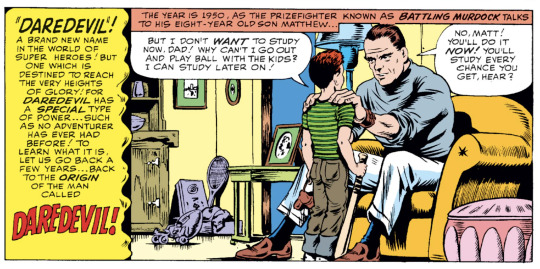
At its core, the story of Matt Murdock is an immigrant story. Matt has the immigrant mentality; immigrants-get-the-job-done type of thing. Gotta hustle and became a lawyer because that’s how he moves up the social and class ladder. And when he does “make it” he chooses to stay and help his neighborhood because he has a cultural connection to it.
This worked in 1964, I don’t know how much it works now.
Hell Kitchen isn’t a rough neighborhood primarily occupied by working-class immigrants, it’s another gentrified hipster hellhole. Irish people and people of Irish ancestry in the United States no long face systemic discrimination.
Therefore, modern-day recontextualizing is to make Matt Mexican.
Technically, Matt can also be from any other Latin American country or Filipino but I lean towards Mexican since a) this is my post go make your own and b) we get the most discrimination from the mainstream media. Yes, a lot of it is because racists use “Mexican” as a catch-all term for anyone from Latin America but still. Trump made his presidential platform by calling Mexicans illegal rapists and druggies.
If Matt was actually the son of Jack Murdock*, an undocumented brown immigrant living in a working-class immigrant/POC neighborhood, it gives him the underdog immigrant arc the character is missing in modern-day adaptations. Matt's core is still the same Matt we know and love, he’s still the son of a boxer, whose dad’s pushed him into succeeding academically, who lost his dad to gang violence, and who is extremely Catholic. Someone who wants to fit into middle-class educated (white) society and feels like he has to suppress the "devil" inside until one day he can’t. He's seeing discrimination and poverty and crime and gentrification tear his neighborhood apart and the police turn their back on it since it's predominantly POC. The law has failed them, he's not going to fail them too.
Meg made the fantastic point that Matt should still be white-passing (and ginger) so he could exist somewhere in between worlds. And Matt takes advantage of that, as well as his Columbia Law degree to help his community. Matt not using his conditional whiteness and the fancy degree to “escape” his community and instead help it.
#daredevil#matt murdock#daredevil comics#marvel#foggy nelson#karen page#comics#stan lee#mcu#charlie cox#usaigi meta#usaigi speaks#mateo murdock au
340 notes
·
View notes
Text
The Stormlight Archive - Brandon Sanderson
High fantasy - Detailed world building - mental health
⭐⭐⭐⭐⭐ (5/5)
I will not be the first person to be completely taken in by the depth of the worlds created by Sanderson, but I couldn’t just ignore the huge crater they have left in my mind. I have grown to care deeply about all the characters of this series (MINOR and major), and would consider these books to be amongst my favorite reads ever. The scope of the plot is absolutely enormous yet very easily understood thanks to Sanderson's magical abilities (yes magical abilities because goodness he CAN WRITE), and i cannot wait till i've consumed every single book ever in the Cosmere.
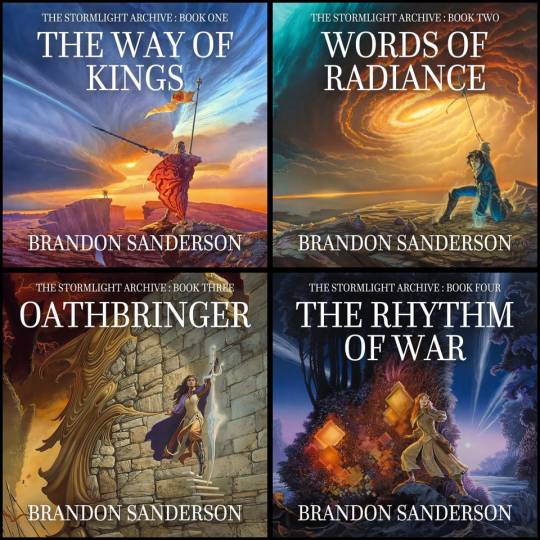
The series follows a group of humans that come from very different backgrounds as they try to save their people, and the planet they call home from "invasion" by what is known as voidbringers. Sanderson introduces us to Kaladin (the sad wet cat baby boi we all love) as the first narrator of the books and how he struggled for years with high-borns, war, and slavery events that were responsible in part for shredding his mental health to pieces. We then meet Shallan (THE CHARACTER for me) who has evidently been through a lot (also shredded mental health) that we will slowly figure out as events unfold. Jasnah, sister to the king, scholar royalty, with most probably a mixture of some kind of shredded mental health, autism, and "aro" something that is not very clear relationship with romance. I will limit myself to these three characters because i could go on forever with every single person in this series (i am not exaggerating).
The writing style is very much accessible. I'm used to fantasy having all kinds of complicated narratives that get in the way of grasping the progress of the plot, but this series is anything but that. Every character's point of view is written in their unique sound (fascinatingly so with Shallan and her ehem buddies) and interestingly we get to experience two sides of every character, their own pov and the way other people perceive them which was very beautiful to read (and incredibly obvious with Jasnah).
These books deal with so much heavy and morally ambiguous topics in surprising detail that i felt i was reading actual events about a place that exists somewhere in our universe. Metal health, slavery, colonialism, war, religion and so so much more that i really cannot understand the power behind the creation of these books.
Most importantly, as it's something i struggled with when i first decided i wanted to read Sanderson's work, these books are very easily understood without having to read the other books in th Cosmere, but people who do will experience a much bigger world with more connections to other events, worlds and "gods" that actually reflects the scope of THE STORY Brandon Sanderson is writing.
I am definitely going to read the rest of the cosmere and will attach a youtube link to anyone interested in starting that suggests the best way to get into the Cosmere that will put events chronologically in a sense.
undefined
youtube
#stormlight archive#brandon sanderson#cosmere#the way of kings#words of radiance#oathbringer#rhythm of war#kaladin stormblessed#shallan davar#jasnah kholin#renarin kholin#adolin kholin#dalinar kholin#navani kholin#fantasy books#hoid cosmere#book review#Youtube
189 notes
·
View notes
Text
Eyeless Jack can use echolocation to check his location, also can sense heat/heartbeats
The rake isn’t just one entity, there’s actually a lot of them out there. Rakes are often misidentified as sleep paralysis demons throughout history
Slenderman and the Operator are the same creature, but the name varies from place to place. There are also many different interpretations of him across the globe; no one really knows there’s more than one slender creature and so all over the world people view him as either a monstrous demon or a kind guardian, which is mainly because of Splendorman’s existence.
(Yes I am aware Slenderman and the Operator are not canonically the same being !! This is just for my au)
Zalgo at one point in time had a whole religion around him. Said religion has disappeared over time and only remains in the form of a single cult.
(Some of my headcanons may be repeats, i have an ass memory so plzzz tell me if im repeating myself 💔)
#eyeless jack#eyeless jack headcanons#eyeless jack creepypasta#slenderman#slenderman headcanons#slenderman creepypasta#the operator#the operator headcanons#operator headcanons#the operator marble hornets#the rake#the rake headcanons#the rake creepypasta#zalgo#zalgo headcanons#zalgo creepypasta#creepypasta#creepypasta headcanons#marble hornets#marble hornets headcanons
55 notes
·
View notes
Text
The “cultural Christianity” stuff is making the rounds again. And what I think a lot of people who object are missing about that designation is that you have to actually leave a culture to not be part of it anymore, and even then, it will still shape a lot of how you first react to things.
I’m American. I have spent, collectively, a grand total of four months (rounded up) outside the US. My parents were born here. My grandparents were born here. I am pretty definitively culturally American, for all that literally no one in my family identifies as “American” before they identify as “Jewish.”
I can say American culture sucks. There’s a lot about it (yes, I know there’s more than one. Yes, they can be quite different. Yes, there can be a great deal of tension between them. No, that doesn’t necessarily make that much difference from the outside. Yes, that is quite relevant to the extended metaphor I’m going for here) that does. What I can’t do is say I’m not actually a part of it. I’m a citizen. I’m surrounded by other Americans at pretty much all times. I’m not emigrating, I’m not making a point of immersing myself in specific local expat communities as a cultural immersion thing. I’m certainly not “from no country.” I definitely don’t have a more objective sense of American culture than someone who isn’t American and is living here reluctantly. I may have a more in-depth sense of it, but there’s no way they don’t have the basics down, because it is fucking everywhere, and they are constantly running into people who are trying to make them assimilate into it (further) in some sort of attempt to help them be normal. And they, unlike me, have a sense of what it looks like in comparison to something else.
Now. Let’s say I decide I hate America and everything it stands for and I don’t want to live here. But my family’s here, and I’ve got positive memories. I don’t have the money to go somewhere else. So rather than actually leave, I develop a deep fixation on another country. Maybe it’s based on a shallow understanding from stereotypes, maybe it’s a genuine respectful interest. But surrounding myself with a bunch of other Americans while we go on about... I dunno, how much we love England and tea does not erase how we’ve spent our whole lives being American, and it certainly doesn’t erase how we’re still living in America. Let’s say I take it a step further. Let’s say I actually emigrate somewhere. There’s two extremes. Either I fully immerse myself in my new country. I learn the language, I participate in the culture, I genuinely try to immerse myself. Or, I feel uncomfortable because things are weird and different and not quite what I’m used to, so I surround myself with a bunch of other American expats, and we spend all of our time talking about America. Maybe we talk about how much we hated it and how awesome we are for leaving it and how much it sucks and how everyone who’s there is terrible. Maybe we talk about the good things. But we’re still centering our existence around America.
But even in the first of those options, where I genuinely try to acculturate, there’s still going to be things that pop up for the rest of my life where those initial few decades of life in the US will shape my expectations. Maybe they’ll be small things “oh right, sales tax is listed on prices here.” Maybe they’ll be big things “excuse me, what just happened in parliament?” But I will always have that American lens with me. Even if I hate it. Even if I found it traumatizing. That’s not a moral judgement on me, it’s just how formative life experiences work. I can become not-American. I can’t become never-American.
Cultural existence in a religious framework -any religious framework -works the same way, because religion both has and shapes culture. When I bitch about the omnipresence of cultural Christianity, I’m not calling anyone who is culturally Christian bad. I’m complaining about the pervasiveness of Christian hegemony. When I complain about culturally Christian atheists (which I only ever do in the context of specific behaviors by specific people), I’m not saying “these people are terrible and unredeemable,” I’m saying “there is a very clear pattern of people taking the step of saying they dislike Christianity but then trying to enforce Christian hegemony by claiming the parts they like are secular, thereby effectively coming across from an outside perspective as a continuation of the general attempt at forced Christianization.”
If you hated the Christian family you grew up with and everything about them and Christianity but like Christmas and want to celebrate it, that’s fine. Genuinely happy for you you’ve got something you enjoy! Have fun! Nog your eggs! Deck your halls! Call it Festivus and put up a pole instead of a tree! Do an anti-Christmas where you decorate with Halloween decorations in Santa costumes and celebrate with spooky stuff! But that doesn’t make it secular. It makes it you finding the one bright spot you had in darkness and hanging onto it. I sincerely respect that -it’s difficult to do. The thing is, I’m not in that darkness, and you trying to insist everyone have that light of yours comes across as yet another person shining the interrogation light of “why can’t you just be normal like me” in my face.
I don’t want Christmas. I want freedom from it. “Everyone can have Christmas” in response to “I don’t want Christmas” doesn’t come across as a friendly offer to share. It comes across as an aggressive attempt to force assimilation specifically on people who say they’re actively fighting it.
473 notes
·
View notes
Text
Literally in the first episode of Fantasy High, I watched an arguement that I had several times with my conservative uncles. It boils down to “According to the main message of your faith, our Divinity accepts everyone who is good of heart and kind - hating people for any reason is antithetical.” Kristen was arguing positive points using her faith as a guide
Which like - im not a christian or religious anymore (raised southern baptists and decided that if God exists he’s cruel) but the immediate writing off of everyone who’s part of a Main Stream Religion as Problematic really pisses me off, ya know?
Like sure, Wolfsong has waterslides and snowball fight and a lot of entertainement during a major holiday and then everyone is trying to figure out how they’re evil ehen they’re just having fun. Hey, my former church (Prestonwood Baptist Church and Benttree Community church in Dallas Texas) i have met so may deeply devout and scripture oriented people who are so incredibly loving and giving that they are leagues above anyone else I know, and for Good Friday they still had a wayer slide cause that shit is fun. Some of the most hateful people I know ALSO use religion as an excuse.
I get that organized Religion can house a lot of hate and evil (im writing my thesis on American Fascism and evangelical faith is a big part) but so many people who are Religious are just good people? Like the basic morals of the Torah+Talmund, the Bible and the Qur’an are really positive? Half the catholic church is socialist?
It just speaks to the religious illiteracy in America. Helio isn’t bad - the racist worshippers who through ‘as above so below’ influence their god ARE bad. Brennan says the Harvestmen are a fringe Minority - newsflash, the KKK is a christian group and the majority of christians reject them and find their message to be a spit in the face to Jesus. Why would it be different in Fantasy High if its supposed to be a commentary? I think Helio chose Kristen because he wanted her to free him from the racist status quo (he was giving her spells for all of freshman year supporting her against Sol up until Spring break if not beyond)
#fantasy high#dimension 20#fantasy high junior year#fhjy#saint kristen applebees#kristen fantasy high#kristen applebees#helio#i think Helio is a himbo#and his dad is a Monarch#galicaea literally murdered Cassanra and y’all root for her church to get redeemed but Sol and Helio? Evil and doomed to hell#it also shows a misunderstand of dnd ‘good’#the evil gods are the ones who send demon armies or try to destroy civilization#sol is a manipulative and stern bastard but when the Apocalypse comes#he’s probably gonna save us#dnd ‘good’ is different from our good
52 notes
·
View notes
Text
Saying “some people socially and medically transition and are seen as a woman or a man by those around them and should be treated as men or women” is one thing but this website is on a whole other level. Everyone has a gender identity that we have no way to verify, exists solely in one’s head, but we must respect it, put it into law, and affirm it higher than the sex one is born as. They use the word gender constantly and are essentially speaking a different language. There are a million gender identities but yet none. The confusion is the point, but anyone who is confused and calls it nonsense is a bigot. Because they are so deeply into their religion, they see it an obvious. But in reality, it is constructed inside their head. I once identified as genderfluid, nonbinary and used neopronouns lol when I say it’s a religion I mean it. Someone can have a sincere belief in something unprovable without being delusional- it’s called religion. And the concept of a gender identity, especially one more important than sex, is one. The concept, like any religion, is hard to define, constantly changing and at war with other people who believe in it. No one can pinpoint how many rules there are or if there should be any in the first place. Wearing different clothes than your sex is supposed to and messing around with the concept of what it means to be an ideal ‘man’ or ‘woman’ is perfect and always been a part of gay culture. That’s not what this is. The people on this website are playing pretend. They think they’re messing with and rebelling against society like the gays of the 20th century but they’re not. They’re playing a game- a game constructed in their own head, a game that posits someone’s internal sense of self is more important than psychical reality. There sense of self is hinged on this, like most religious people. Telling them “your god/gender identity” does not exist is taken to mean YOU don’t exist. They, like any religion person, take people’s confusion and disagreement as an attack- they see themselves as the counter culture. They think this is rebelling against the establishment, to use neopronouns, to say a lesbian is a ‘queer attraction to women’ or any other nonsensical meaning, to say you are catgender, to say you are a man or a woman. They’re not doing anything to dispel the patriarchy or heterosexual domination. They are playing a game. They think the fact it’s a game means it’s revolutionary- it’s not. They are prisoners arguing over what color to paint their wall. I mean it when I say it plays so well with not doing anything to the powers that be that it might as well be a CIA plot. It’s done nothing to actually change society, long or short term. The only thing it has done is make us unable to describe ourselves, make communication clogged up and complicated, essentially meaningless and exhausting. It’s enabled predators to say ‘lesbians can like men too!’ It’s confused and overwhelmed people into not talking about heteropartriachy because now there are a million new terms we have to think about, a million new ways we could say something wrong. And instead of discoursing about anything meaningful, we are discoursing whether men can be lesbians or whether ‘autisticgender’ is ableist. Our conversations are meaningless. Because our words are meaningless. When lesbian means nothing, when women means nothing, when gay means nothing, but yet we are still here… you have done nothing to help anyone. You have only made conversation harder and done the work of our oppressor. And sure a lot of this only exists online. But this nebulous ‘gender identity’ is taken as fact, this concept of lesbian meaning ‘non men loving non men’ is put into serious conversations.
Yet, they have the audacity to say radical feminists are doing the work of the patriarchy when that is what they are doing. Who benefits when ‘men’ and ‘women’ are now reduced to a feeling in ones head, or some undefined social role or concept? Who benefits when now, lesbian and gay men means basically nothing? Who benefits when women is now something you can opt in or out of? Who benefits from conversations about gender being a joke? Who benefits from this? You think men aren’t benefiting? You think it’s straight people who are being hurt when we struggle to define ‘lesbian’? You think you’re fighting the system? You’re doing its work.
#radblr#radfem#radical feminism#radical feminists do interact#gender critical#radical feminist safe#Discourse#anti gender#My post#My bangers
110 notes
·
View notes